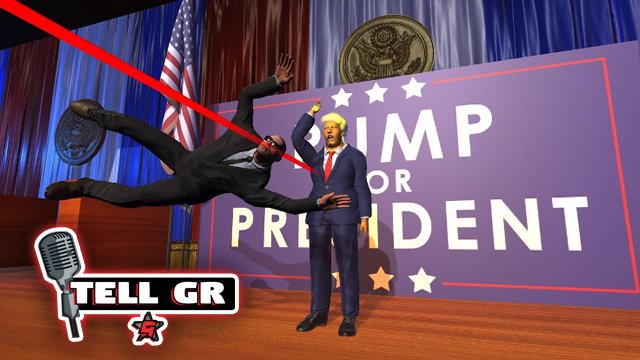Oh boy, here we go. Video games and politics are a controversial combo, but we’re spicing this Monday up with hot takes from the GameRevolution team on the subject of whether or not games should be more political.
But d’you think there’s already too much politics in games? Do you just want to play games for their escapism, and feel like politics would ruin that? As always, share your own opinion in the comments section below. We’ll feature our favorite responses in tomorrow’s Tell GR.
Paul Tamburro, executive editor: “Undoubtedly. Considering how much bleating there is about games being “too political,” the reality is that pretty much every major publisher shies away from attaching its name to a strong political opinion. The mind-numbing lack of thoughtful narratives in video games in general means that even putting a woman in a game is seen as a strong political stance, and god forbid that woman is also LGBT+.
When you compare games to other entertainment mediums, it’s pretty startling to consider just how far behind it is in terms of addressing controversial but meaningful topics. In trying to appeal to the broadest demographic possible, most video games wind up not really saying anything of note. It’d be nice if the industry would stop being so damn centrist and say something impactful for once.”
Jason Faulkner, senior editor: “Just like with movies, TV, and books, I think that when done right, games can make for engaging political commentary. For me, though, it depends on what the game is, and the quality of the discourse. Spec Ops: The Line, for example, managed to drive home its point without bashing your brains in with it.
Some stories are just apolitical, though. I don’t think commentary on today’s politics is appropriate in, say, a game like Resident Evil 2 that is set in a zombie outbreak in 1998. It’s also hard to make a game feel timeless and make any specific political comment. Spec Ops worked because it gave a general message about the nature of war which will still be applicable years down the road.
I think morality, much more so than politics, is something that needs to be injected into more games. Let players choose which side of an issue they want to fall on, then show the consequences. Instead of pushing someone into a particular course of action, make them want to do the right thing. This is the beauty of games over any other form of media, players can have the freedom to come to the “right” conclusion themselves.
The whole, “you can lead a horse to water,” idiom applies perfectly to politics in mainstream video games. Make a product that is entertaining without taking into account any political ideology and then allow those who want to partake in it to choose to do so. Indies can take the bigger risk of going all in, but mainstream games can still tell political stories without being overtly political and divisive. An allegory without the deeper meaning is still a story, and there’s a way for bigger studios to take a stance on politics without alienating their audience.”
Mack Ashworth, lead editor: “As much as I’d love AAA games to start going in hard with politics, clearly picking a side and sticking to it, I can understand why big studios would hesitate at potentially alienating millions of players. While I commend AAA games for highlighting problems with race, gender, and sexuality, where (I hope) the “right side” is more clear, I can see why punches will be pulled when it comes to US and EU politics. If game development costs are indeed on the increase, then I can’t see many pubs opting to lose money by being too outspoken. (Indies, please keep the political discourse coming!)”
Michael Leri, features editor: “Video games shouldn’t be afraid to have politics in them, which has been a frustrating notion for some AAA games. Far Cry 5 was gutless and tried to use current political divides as weak, out of touch punchlines that pretended like this was all a big joke. In essence, it took the Jimmy Fallon approach while it maybe should have taken the Stephen Colbert approach. And looking at the ratings and undeniably stronger wit of Colbert shows that he’s onto something.
Ubisoft seems to also want to pull its punches with The Division 2 and this mindset not only holds the medium back but it also feels like a cowardly approach to not piss anyone off. Art is inherently personal and denying bigger games the platform to say something or using them to play the center does a disservice to gaming and its audience.”
Bradley Russell, news editor: “Video games should absolutely be more political if it ever wants to properly advance as a medium. If the best story a multi-billion industry has ever come up with involves a man and a pre-teen girl making their way through a zombie apocalypse then you’ve got yourself a problem. Embrace messages. Embrace politics. Embrace an actual position without cowardly backing away because of some phantom backlash that might land on a publisher’s doorstep.”










